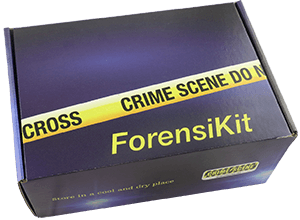
Bill Rogers interview
Saturday, September 14, 2020 – 3:15 p.m.
William Rogers is a Yoknapatawpha Acres nursing home resident.
Detectives Armstrong and Murphy interviewed him at Yoknapatawpha Acres.
Participants:
- Detective T. Armstrong
- Detective S. Murphy
- William "Bill" Rogers
Detective Murphy: For the record, please state your name and address.
Bill Rogers: My name is William Rogers. You can call me Bill, and it's better if you do.
Detective Murphy: Why is that?
Bill Rogers: William's my father. It gets very confusing having two people with the same name under one roof.
Detective Murphy: And what's your address?
Bill Rogers: You're standing in it. I don't know the street number or anything. Don't get much in the way of mail.
Detective Armstrong: So, Bill, did you hear what happened with Jerry Shaw?
Bill Rogers: In a manner of speaking. My hearing isn't what it used to be, but that doesn't keep me from knowing what's going on. The young man tangled with a dumpster and came in second.
Detective Armstrong: What do you remember about the day he died?
Bill Rogers: They served strawberry Jell-O for dessert.
Detective Murphy: Do you like strawberry Jell-O?
Bill Rogers: What's that?
Detective Murphy: Do you like strawberry Jell-O?
Bill Rogers: No, but they serve it here every day. People used to complain about the food the airlines served. They ought to try flying Yok Acres. Granted, many of the residents here don't have a full head of teeth, but the food we get here isn't much more than seven shades of mush. Not much flavor, either.
Detective Armstrong: What was your impression of Jerry Shaw?
Bill Rogers: Maybe the man should have eaten a little more Jell-O, a little less tapioca. These young folks, they're greedy. They eat too much. They spend too much. And what's with the tattoos? Once upon a time, you didn't see that outside a carnival. It was a novelty. Now, it's just something else to put on the charge card.
Detective Murphy: We're talking to the residents, trying to re-create Jerry's last day. How can you help us with that, Bill?
Bill Rogers: Well, as Al will tell you—he's my roommate—my hearing isn't what it used to be, but I'm a man who likes to know what's happening in the world. I'm inquisitive. Got a nose for adventure. What other people hear and don't notice, I see.
Detective Murphy: What did you see?
Bill Rogers: Young lady, I've seen a lot, and what I've seen is that people don't change. They harden. They stick to a piece of ground, and they let that piece of ground define them. Next thing you know, they're working that ground, they're eating it, and they're breathing it, and I daresay they're passing it. They get so they can't see anything except for that ground, and then they become consumed by their rituals with it. Jerry, he went through the motions the way an ant goes through the motions.
Detective Armstrong: Can you be more specific?
Bill Rogers: Beg pardon?
Detective Armstrong: Can you be more specific?
Bill Rogers: Not really, because Jerry couldn't. He just kept working that rut, day after day, week after week. That's why visitors such as yourselves are so important. When you come in here, you're still alive. You're thinking of what you're going to do next when you leave.
Detective Murphy: Do you get many visitors?
Bill Rogers: I wouldn't be able to hear them if I did. My daughter knows that. Mary-Ann. She does something at the college. She's my pride and joy.
Detective Armstrong: Did you perhaps notice any visitors the day Jerry died?
Bill Rogers: That was an exciting day—all the police and ambulance and fire. An ambulance, that's not such a rare sight here, but we don't see much of you folks. Makes a day stand out, stick in your mind. The oxygen fellow was here that day. Magnolia's boy. Part of the reason I remember so well is that I'm towards the end of the hall. Only two rooms past me to visit unless someone plans to go through the emergency exit, which happens. And sometimes it's not visitors, either.
Detective Murphy: What do you mean?
Bill Rogers: Some of the residents, they're not all there, and they're always trying to get home. Others, well, they just feel like moving on.
Detective Murphy: Do you ever feel that way yourself?
Bill Rogers: I play the television loud. After a while, I can't hear myself think.
Detective Armstrong: Do you remember seeing much of Jerry that day?
Bill Rogers: Saw him pass and then pass again. Must have been Magnolia or Rose since the room across from them is empty at the moment. Maybe five, maybe ten minutes passed. Magnolia's boy left a couple minutes after that.
Detective Armstrong: Magnolia's boy?
Bill Rogers: What's that?
Detective Armstrong: Who is Magnolia's boy?
Bill Rogers: Ed Harbison. Keeping his mother here chews him up some. He always drags his heels as he's going, as if guilt was holding him back. Guilt, she's a powerful motivator.
Detective Armstrong: And the oxygen fellow?
Bill Rogers: He's always in and out. He's not much better than the staff, not worth noticing.
Detective Armstrong: Everybody around here get along pretty good?
Bill Rogers: You know how people are. Nobody gets along all the time.
Detective Armstrong: Anybody in particular?
Bill Rogers: You all met Magnolia yet?
Detective Armstrong: Yes.
Bill Rogers: There you go.
Detective Armstrong: Anyone else?
Bill Rogers: You know how it is. People cooped up with each other all the time. There's bound to be dustups every now and again.
Detective Armstrong: Between the residents?
Bill Rogers: Between everybody eventually. Residents, employees, take your pick.
Detective Armstrong: Oh yeah? Like who?
Bill Rogers: What's that?
Detective Armstrong: Which residents and employees had dustups?
Bill Rogers: Sorry, I didn't catch that.
Detective Armstrong: Uh-huh.
Detective Murphy: Thank you for giving us so much of your time today, Bill.
Bill Rogers: Time is something I have and also something I don't have. I'm just disappointed you didn't bring me downtown in cuffs.
Detective Armstrong: Why would we do that?
Bill Rogers: It would have helped to break up the monotony.
Interview ended – 3:38 p.m.

